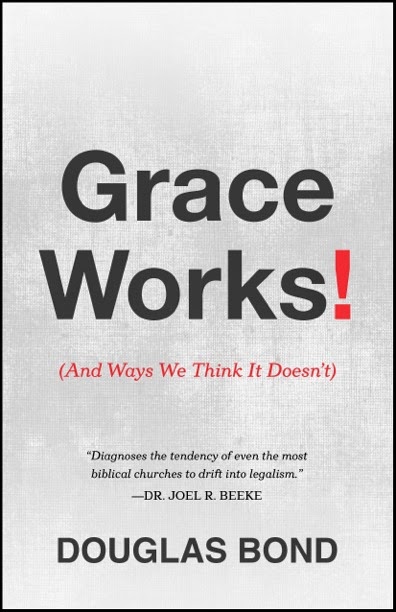On Glorying Only in the Cross of Our Lord Jesus Christ
John Calvin
But God forbid that I should glory, save in the cross of our Lord Jesus Christ, by whom the world is crucified unto me, and I unto the world. For in Christ Jesus neither circumcision availeth any thing nor uncircumcision, but a new creature. And as many as walk according to this rule, peace be on them, and mercy, and upon the Israel of God. From henceforth let no man trouble me: for I bear in my body the marks of the Lord Jesus. Brethren, the grace of our Lord Jesus Christ be with your spirit. Amen. - Gal. 6:14-18
We saw earlier that Paul condemned those whose only desire was to sit on the fence in order to please the world, and escape persecution. For this had caused them to twist the gospel, and we see numerous examples of this today. Having seen that pure doctrine and the truth of God are unacceptable to the world, but that wicked men are incensed against it, these people, I say, seek to find some way to avoid creating bad feeling and incurring hatred. This being so, if we today were to interview people with at least some good sense, we would scarcely find one in a hundred of them who would admit that there were errors in the Papacy. Most would say that we ought not to force them to abandon everything and that it would be enough if they were to get rid of some of their more unreasonable and absurd superstitions, even if they continued to nurture many other corruptions. Why? Because, as we have said, they desire to be esteemed and highly credited, and because it is all the same to them if they betray the purity of the gospel, provided they can remain exempt from persecution. What is it that motivates them, but the fact that they wish to be valued and to acquire a good reputation? Now the devil, who has stirred up this kind of conflict ever since the days of Paul, continues to this present day, and therefore we need to arm ourselves with this doctrine. The best remedy is the one that Paul proposes here: that we reject all glorying, save that which is in the cross of our Lord Jesus Christ.
In order to understand this clearly, we must firstly remember what is written in Jeremiah, and confirmed here by Paul. In other words, that all the glory of man must be abased in order that God be exalted as he deserves. (Jer. 9:23, 24). Indeed, in the same way it is written that all the wisdom that men believe they possess is nothing, and will not be taken into account; it must be blotted out, that we might have recourse to God, as the one who has all abundance of good things in himself (Isa. 29:14; 1 Cor 1:19). Let us acknowledge, I say, that all wisdom proceeds from his free grace, so that we are enlightened by his Holy Spirit, and, being weak, strengthened by his might. Being full of pollution and iniquity, may righteousness be restored in us according to his gift.
Now let us come to the means. It is not enough to know that God is our light, that he is our righteousness, that he is our wisdom, and that he is our strength; in other words, that in his person is perfect life, joy and felicity. This is insufficient, for there is still too great a distance between himself and us. Yet we need to know how and by what means we can obtain all the graces that we seek in God. We know that they are all communicated to us in Jesus Christ, for he descended here below, made himself nothing, and was crucified willingly for our sakes. Therefore, since we must draw all that we lack from the Lord Jesus Christ, we can understand why Paul says that he sought only to glory in the cross of our Lord Jesus Christ. Why? Because he suffered a cruel and bitter death, and even exposed himself to God’s judgment on our behalf, receiving all our curse, and in this way was given to us as our wisdom, righteousness, holiness, strength and all that we lack.
Therefore, in the first place, we need to know who we are, before we can prevent all glorying and stay ourselves upon the Lord Jesus Christ. For we see many people bursting with pride who have no grounds for this whatsoever. All that they imagine to be true about themselves is no more than wind and smoke. Yet because they have not examined themselves properly to see what they are really like, they have not sought Jesus Christ; such are these hypocrites, and counterfeits, who are puffed up with presumption because of their ‘merits’. Therefore, as I have said, we must consider our condition and see the extent of its wretchedness, that is until the Lord Jesus takes pity upon us. This is how we can prepare ourselves to come to him. This is the first point.
However, this is not all. For there are some who will confess that they are sinners, and that they are full of nothing but vanity, and yet continue to wallow in their filth. Why? Because they do not anticipate the judgment of God, and their minds have been lulled to sleep by the world. All such pleasure-seekers, who abandon themselves to drunkenness, or bawdiness, and the like, cannot excuse their wickedness, and indeed, they ought to be ashamed of it, and yet they seem to take pleasure in sins and continue in them as if hardened. Why? They have been intoxicated by the world, and blindfolded by the devil, such that they cannot see that one day they must give an account of themselves. They have stupidly made themselves believe that they will always remain as they are, pursuing evil things, and that they will never have to sigh and tremble, but only laugh, as if they seek wilfully to show contempt for God. Thus, we can see how it is that some are prevented (indeed, they are fully incapacitated) from coming to Jesus Christ, either because they presume to have their own wisdom, or because they are pursuing a false notion that Satan has placed in their minds, or because they think they are wise enough without Jesus Christ. These are the reasons why they despise him. Others, of whom there are an infinite number, know that they are poor sinners, and yet do not seek a remedy. Why? Because this world has them in its grip, and they are so caught up in it that they cannot lift their eyes or their minds above to seek for the remedy that has been provided in Jesus Christ.
We must, therefore, be all the more ready to meditate on what I have said, that is, to rid ourselves of all pride and presumption, and to feel so much shame that we have no rest until we have found relief in the Lord Jesus Christ. May we open our eyes to see our depravity and be ashamed of it, and not only so, but also to recognise that this life is nothing, and that God has placed us here as on a journey, so that he can test whether or not we are following him. May each of us therefore come aside, both morning and evening, to consider our sins, and may they be like goads to prick us and encourage us to come to God. May we not be like brute beasts, tied to this world, but may our need lead us to come to the Lord Jesus Christ. This is what it is to glory in the cross of the Lord Jesus Christ.
Paul specifically speaks of the cross here because he seeks to knock down and trample underfoot all haughtiness in man. For we always want to be ‘someone’ in and of ourselves, and maintain a certain dignity. Therefore, in order to rid us of such a wicked desire, Paul shows us that Jesus Christ, the Son of God, should be our only cause of glorying because he was crucified for us. Following on from this, he adds that we will be crucified to the world, and the world to us, when we have learned to glory only in the grace that our Lord Jesus Christ has brought us. How? Those who are not crucified to the world, that is, those who desire to have a position of some authority, and to be important, and who ask to be held in honour and promoted, in other words those who are diverted here, there and everywhere by their lusts, certainly do not yet know what it is to glory in the cross of Jesus Christ, for they begin at the wrong point. They are confused within themselves.
Therefore, Paul can say with confidence that when his glorying was founded upon the cross of the Lord Jesus Christ, he abandoned and forsook the world. By ‘world’ he means all that appeals to our flesh, to men who neither think of God nor of eternal life, but are given over to avarice or ambition. Each one is controlled by his own natural instincts, and not one looks beyond this world. When men follow their inclinations and when God has not touched them by his Holy Spirit or drawn them to himself, it is true to say that though they have all strayed and roamed, yet there is a great variation in their desires, such that, when we examine the matter, we find that one is heading in a certain direction, whilst another is pulling in completely the opposite direction. Thus, it seems as if men are very different from one another. However, they are all alike in one area, that is to say that they want to be important in the eyes of the world, and are given over to their personal profit or pleasure. In other words, they are so enmeshed in things here below that they do not mind being separated from God. But Paul says that if all our glorying is in Jesus Christ, knowing that by means of his cross he has committed us to God the Father, and has secured the kingdom of heaven for us, then it will be easy for us to withdraw from the world and cut ourselves off from it, as it were. Why? Whoever has been cut to the quick and overwhelmed with a sense of their own sin will surely seek the grace offered to him in Jesus Christ, and the world will be worth nothing to him.
Indeed, we treat all the spiritual riches that God has offered us and invites us to share as if they were nothing, because, in comparison to the deceptions and temptations of Satan, we do not value them at all. What is this world, when we contemplate it as it is? Not one of us sees just how fragile our lives are, that they are but smoke which floats past and then vanishes. Men still burn with lust and are transported and carried away thereby. As for God, he calls out, ‘Poor people! You have less sense than little children, in that you busy yourselves about wisps of straw, meaningless rubbish, and all kinds of nonsense, and attach yourselves whole-heartedly to these things. Yet when I offer you that which is perfect felicity, you ignore it; to you it is unimportant.’ Hence, the reason that we are so cold and so slow to accept the riches that God offers us is that we are preoccupied with the things of this world. Indeed, we value this world too highly. What makes us do this? It is because we do not know what priceless riches God is offering us.
Therefore, let us join together these two things: namely, let us be crucified to the world, and the world to us, glorying alone in Jesus Christ crucified. Now this is easier to say than to do, and yet each of us, wherever we are, must strive to do so; once we have heard this doctrine, we must put it into practice. For if we would be esteemed and accounted Christians before God and his angels, we must conform to what Paul tells us here; indeed, if we were not otherwise-minded, we would find plenty of opportunity to do so, as I have already said. For all those who simply look within themselves and consider what they are really like, and what condition they are in whilst still separated from Jesus Christ, will be terrified of feeling the wrath of God which they deserve. They will feel that they are ruined by their accursed state, and that it would be better if the earth were to swallow them a hundred times, rather than live under this curse for a single day as the enemies of God who cannot escape his hand. Let us therefore learn to examine ourselves. Those who wish to adorn themselves according to this world, especially women, will gaze into a mirror with great curiosity and concern. Yet our poverty and filth will not be reflected there, in order truly to humble us before God, or make us consider what we glory in. The one who recognises his shame and ignominy will certainly seek to remedy it, if indeed the Spirit of God is working deep within him, and he is not (as I have already said) intoxicated by Satan. Let us, therefore, learn to examine ourselves sincerely, without flattery, and when we have acknowledged our poverty and misery, let us come to the Lord Jesus Christ. Since, by means of the cross, all haughtiness, self-worth and boasting is cast down, let us be truly crucified to the world and may it mean nothing to us.
Now, by saying that the world was crucified to him and he to the world, it is certain that Paul means the same thing, yet he wants to reinforce that we can indeed renounce this world and be separate from it, by being crucified to ourselves with regard to the world. This means that all our loathsome desires (which are far too strong in us and consume us like a burning flame, pushing us in one direction, then another), must be mortified, for we know that the Son of God had to suffer such a shameful death on our behalf. Who is he who seeks to have his triumphs and do his courageous deeds in this world, when he knows that the One who is the head of angels, to whom belongs all glory, majesty and authority, hung on a tree and was cursed and hated for our sakes? In this way, all our lusts must be mortified; therefore, may the passion and death of our Lord Jesus Christ be so effectual in our hearts, that our desires do not quiver impatiently within us as once they did. This is the first point.
Also, the world must be crucified to us. How is this? In comparison to the spiritual riches that Jesus Christ brings us, and which we enjoy through him, may we esteem the things of this world as straw and corruption, since all is corruptible. Furthermore, all that men covet so earnestly and with such determination that they become completely hindered by it, are nothing more than nets that Satan has spread in order to catch them. Are they not illusions and deceptions? Yes, this is most certain. Since this is so, let us learn that the world ought to be nothing to us, and let us be completely persuaded and assured of the fact that God is merciful to us, and acknowledges us as his sons and heirs; he has blessed us and without his blessing we would be most miserable. Hence, we are to pass lightly by this world and not be attached to it or held back for anything; this must always be our aim. We know that we must make haste to the place to which God has called us, and if we become enmeshed by the love of this world, we will become alienated from our God. This is what we are to remember from this passage.
At this point Paul adds that ‘in Christ Jesus neither circumcision availeth any thing, nor uncircumcision, but a new creature’. It is as if he is telling us that those who troubled the church in his day were motivated only by ambition. For if the church did not grow, and no one received any profit in any way as a result of the great trouble they stirred up, it surely proves that they were only seeking to replace the Lord Jesus Christ. For what should our aim be, but to see the Son of God reigning in our midst, and to be ruled by the Word of his gospel, and to know his power, so that all of us, great and small, place our entire trust in him? Following on from this, we aim to have our whole life transformed, that we might live in obedience to God and submit to his Word. For the spiritual temple of God is built upon faith and a new life; faith leads us to pay homage to God for all his riches, and to have recourse to him, and declare his praises — to call upon his holy name when we meet together. This is how we are built up to become the temple of God.
However, we must also be renewed in our lifestyle, and patiently learn to deny ourselves and dedicate our lives to God. This ought to be the message of those who have the responsibility to teach. Those who do not aim at these things reveal that they have no intention of serving the Lord Jesus Christ. Thus Paul declares that the only important thing is to be a new creature in Jesus Christ. In other words, we must come to the point where, as we saw in Second Corinthians, we are new creatures, if we want to be considered to be ‘in Jesus Christ’ (2 Cor 5:17). For if anyone boasts that he is most eloquent, and another that he is very clever, and another that he is a great scholar, and another that he has good manners, it is all vanity. Let us, therefore, learn to forsake ourselves and this world, and to dedicate ourselves to the one who bought us so that we might be set free. For it is only right that Jesus Christ who obtained us at such cost should possess us and rejoice greatly over us. This cannot be achieved unless we each deny ourselves and reject all that could hold us back amongst men. This is what we need to observe.
Paul speaks here of circumcision and uncircumcision because the dispute and the argument he had (as we have seen previously) concerned the ceremonial law, which he deals with here through the example of circumcision. For the Jews sought to retain all the types and shadows which were only intended to last for a time. Thus, Paul, ridiculing all this, says that our Lord Jesus Christ came, not to encourage us to keep these ancient figures, but, because the veil of the temple was torn in two, and because he is in himself the body and substance of all the shadows that existed under the law, we must now content ourselves with him, circumcision no longer being of any value.
We will derive greater profit from this passage if we apply it to what we see today. For, in the Papacy, there are many pointless rituals in which they place all their trust in order to be holy. When we ask the Papists how they can merit God’s grace and obtain remission of their sins, they boast that they have their holy water, their candles, their incense, their organs and choirs, their pilgrimages and this and that. Also, they have their foolish devotions, which involve trotting from altar to altar and from chapel to chapel. Then they must, of course, buy a good number of masses. In short, all that the Papists refer to as the service of God is nothing more than a Labyrinth, or an abyss, of superstitions which they have forged in their own heads. Let us come now to consider what these things are worth. God has made no mention of them; but they have been invented by men, in whose ears Satan has whispered in order to corrupt the true service of God. However, the Papists consider that there can be no religion, nor faith, nor service of God, nor zeal unless we too are transported by all their nonsense. Yet Paul, speaking of the ceremonies that God had ordained in the law, says that they are no longer anything. Why? Because God is content if we serve him with a pure conscience, and call upon him, having put our trust in him, knowing that all good things come from him. Let us, rather, live uprightly and honestly with one another, knowing that charity is the bond of perfection, and the end of the law; and let us also so dedicate ourselves to our God that we live chastely and in all holiness, waiting for the coming of our Lord Jesus Christ, as it says in Titus (Tit. 2:12-13). This is the starting point of holiness and perfection, as declared by God in his Word.
Yet the Papists will say on the other hand, ‘What! And what kill become of our lovely devotions? Will they all be abolished? It were better to pull God out of heaven!’ This reveals the Papist’s folly. We have seen what Paul has exposed here; that even if men are so mistaken about their own inventions that they think they offer God wonderful things, and are held back by these meaningless trifles, it is all worthless. Who has declared this? God, by the mouth of Paul. What, then, ought we to be? New creatures. What is a new creature? We must start by examining our lives and seeing ourselves as nothing in and of ourselves. Then we must offer to God the spiritual sacrifices that we owe him, presenting ourselves to him that he might have pity and mercy upon our misery, and aid and help us. May we be ready to follow him as he calls us, having no other source of wisdom but his Word alone, knowing that he does not wish to be served with pomp or with the fine, glittering external appearances that appeal to the world. He is content if we devote our thoughts and affections to him in sincerity. Moreover, it is our responsibility to understand what Paul is saying here, and to apply his teaching; for it is certain that those who refuse to flatter themselves in their sins, and who look to God, knowing that they must appear before his judgment seat, will forsake all glorying in themselves.
Furthermore, they will know what God demands in his Word, and how he would be served, and what he delights in, so that they will no longer be in danger of being deceived by the meaningless trifles which hypocrites pursue. For it is most certain that when the Papists torment themselves in order to serve God (as we see), it is only so that he will count them innocent, and so that they may escape his hand, and not be constrained to serve him as he has commanded; for they despise the whole law. Yet there are many things which they do regard as vital, and which they desire God to accept. But (as I have said) their main aim is to believe that their duty to God has been fulfilled, so that he will not oppress them too much. Meanwhile, they follow their own course, allow themselves great licence and grant themselves absolution of all their sins. They think that since they have brought God something (that is, a mere shadow), he dare not speak a word against them and has to remain silent. Now we have seen Paul’s intention here.
Finally, he adds, ‘And as many as walk according to this rule, peace be on them, and mercy and upon the Israel of God.’ By speaking of this ‘rule’, he implies that men may believe what they choose, and yet God will not give way to them, for he is immutable and will not yield to folly or be made to retreat. Paul tells us that such alteration is impossible. Whatever happens, the rule that God has established remains as it is, unchanging. This is something which we all accept on the surface of things. For who would not readily accept the fact that God is superior to us? We even feel that to say the contrary is to blaspheme. Thus we are all quite sure that God ought to reign, and that his law ought to be our rule for living. Yet, at the same time, see how men allow themselves to live without restraint! Each person invents this and that, and soon afterwards expects everyone else to hold to their inventions. Everyone wants to have their own separate rules. Whilst it may be true that not everyone in Popery follows the rule of St Francis, or of St Dominic, yet there is not a single foolish old woman or bigot in Popery who has not got his own rule. Just as there is not a single young calf who has not also his own rule for living. For all will say, ‘This is the way I do my devotions.’ And when they use the word ‘devotion’, they virtually push God into the background because they are really saying, ‘I must have the liberty to do what I think is good, and God must content himself with that.’
What diabolical audacity men have! They compromise here and there, they talk wildly, they deviate first to one side then to the other. It is as if they make for themselves winding and crooked pathways, hoping that God will twist his rules and be pliable enough to bend to suit their own views. Therefore we have all the more reason to observe carefully what is said here, which is that men may torment themselves all they like, but God’s rule remains and will follow its own course and direction.
What is this rule? It is that we aim for the perfection that our Lord Jesus reveals in the gospel; not that we can attain this during our lifetime, but rather that we are not to step aside one way or another, to the right or to the left, but to aim always for the goal that God has revealed to us. This is how we can be new creatures, by denying ourselves and dedicating ourselves fully to God. Since this is the case, let us make a decision to submit to this rule, and conform our lives to it. For each one of us immediately picks up our feet and legs to run off here or there; but in order not to go astray, we need to learn to hold fast to all that God reveals and teaches us in his Word. Now when Paul asks that peace and mercy be upon such people, it is to declare that, even if all in the world were foolishly to condemn us, we could ignore it and refuse to let it bother us, pursuing our own course. If God is for us, that ought to be sufficient. For if we are shaken by the foolish judgments of the world, and the opinions that they spread about us, we are not rendering to God the honour that is his due. If folk say of us, ‘Those people are not living good lives’, and we get upset and seek to conform to their tastes, we will surely be moving away from God.
Therefore, let us take good note of what Paul says here, which is that if men condemn us and find things to criticise in that which we do (and it is obvious that the world will never be in harmony with God), it should mean nothing to us. It ought to suffice us that God has blessed us, and offers us complete happiness in this word ‘peace’, showing that he will have pity on us, however wretched we may be, and however much others may spit in our faces. Although we do not have all the virtues required of us, yet if we aim to follow God, we will always find him to be merciful. He supports us in our weakness, and aids us in our wretchedness. If we have all this, it ought to be enough. On the other hand, although the Holy Spirit blesses those who submit to God’s rule, we also know that he curses and detests and loathes all those who go astray, and who make their own imaginations their law. They seek to have liberty to follow whatever seems right to them, and harden themselves against the Word of God. However valued they are by the world, and however much they are intoxicated with pride and presumption, thinking they are ever so important, we can see that God still regards them as detestable. This is what we need to remember: there is only one rule by which we must live and that is contained in the gospel.
Where does this rule lead us? It will ensure that we do not offer to God that which seems right to us, or that which we have forged in our own heads. Instead, we will submit ourselves fully to him and to his Word. We will recognise that in Jesus Christ we have all perfection. Thus we will be content with him alone, especially since we know he is merciful enough to show us pity, and our lives will be blessed and made happy by him, if we follow him to the place where he calls us. Conversely, we will be cursed unless we follow the rule that Paul speaks of here, no matter what opinion the world has of us, or however much the world may praise us.
Now he adds ‘the Israel of God’, to prove that those who serve God spiritually, he will always be pleased to acknowledge as his people. For the enemies of Paul, against whom he has a quarrel in this whole epistle, wanted to maintain all the ceremonies, as it seemed to them that these were the marks of the true church, just as the Papists today want to keep the holy oil, and this and that. But the enemies of Paul had much stronger grounds than the Papists, and in comparison their case was stronger. Yet Paul still rejects it all, and says that God does not concern himself with any of this. Whilst it is true that he had ordained the shadows of the law for a time, and they had their function, which was to lead the people to the Lord Jesus Christ, now that we have the substance and the truth in him, we must forsake it all. We have an even stronger reason, therefore, to say that the Israel of God are not those who appear in great splendour before the eyes of men, but those who bear the true mark of God. For when the Papists speak to us of the church, they must include the Pope with his three crowns, and the bishops, who disguise themselves in order to act out their farce. They are like horned beasts, and everything about them glistens; the priests and the monks are among them and they too dazzle the eyes of the simple. This is what the church of God consists of according to the Papists: in pomp and frivolous, useless nonsense. What of the sacraments? No, they need this or that extra thing — in short, they have their own marks which seem quite acceptable to them.
Yet we must look at the gospel. What do we find there? All simplicity. God does not want those who preach his Word and administer his sacraments to wear costumes or to make so many fanfares. Nor does he want the sacraments to be polluted by human inventions, because all these are worthless to God. Let us, therefore, retain the definition that Paul gives here of the true church, so that we are unmoved when people say to us, ‘Look, we have many beautiful things here.’ It is true, if we judge according to our natural senses, for we are carnal and earthly and are, therefore, more inclined to follow that which appears beautiful to our senses. But it is not for us to decide how we must serve God; we must hold fast to that which he has proclaimed, because his decree is irrevocable, and it is that we should find all our wisdom in Jesus Christ. This can only happen if we obey him, and not before. Thus, we are to recognise that we must no longer be attached to the external things which he ordained at the time of the law; but we are to be content with Jesus Christ alone and the perfection that is in him.
Let us be sure to notice something else he says at this point: ‘The grace of our Lord Jesus Christ be with your spirit.’ He exposes here that the world, due to its ingratitude, gives no thought to the riches which are offered in Jesus Christ. The gospel is preached often enough, and yet we all withdraw from it and turn away, as if we have decided to leave the good path that leads to salvation and throw ourselves headlong into ruin and perdition: What is the reason for this? It is because our spirits are empty, and the devil always gains entry; he entices us, he troubles us and makes us flutter about in the air. Indeed, until the grace of our Lord Jesus is with our spirit, we are like swaying reeds, without stability or foundation. This is what we need to aim for, so that God not only pours out his grace upon us, but that we also receive it into our spirit and heart; our spirit must become its throne and the place where it takes root, so that we might not be tied to this earth, but raise our affections and minds to God.
Now, because there will never be a time when this doctrine escapes contradiction, Paul here challenges those who would rise up against it, and says, ‘From henceforth let no man trouble me: for I bear in my body the marks of the Lord Jesus’. When he speaks of the marks of Jesus Christ, he sets them in contrast to all the armouries of princes, to all their diadems and sceptres, and to all that they possess to give them importance, and to obtain the worship and reverence of all. When a prince wants to be seen to be in control of his estate, he must be dressed in such a way that none dare look at him for fear of being bedazzled. They do this more often than not because there is nothing about them worthy of note, and so they need to rely on these borrowed means; the same is true of worldly people who give themselves to pomp and gallantry, and use this and that to acquire a good reputation. In short, the worldly will use any means to get themselves noticed, although these things are vanity in and of themselves. But Paul shows that the marks of our Lord Jesus Christ are, as we know, worth so much more, and far more precious, having more beauty in themselves than all that is cherished by the world.
However, we need to consider what is meant by ‘marks’. He has explained this to us before, when he said that he was beaten several times. He had been stoned at one place, put in prison in another, and had suffered hunger and thirst (2 Cor 11:23-27). In other words, he had been regarded as loathsome and was therefore rejected. According to the world, we must flee such ignominy. Yet Paul says that these marks are worth more than all the honour and splendour that we could ever enjoy. He says that because he bears these marks, others must not ‘trouble him’ by preventing him from following his course and fulfilling his duty.
Now Paul’s intention in this passage has been, firstly, to show that if we are Christians and part of the true church of God, we must obey the command to be united to one another. How? Not with each person following their own imaginations; for there are indeed many who have a perverse spirit which makes it impossible for them to cooperate with others. Such people seek to keep themselves separate from everyone else, like wild horses, and it is to be hoped that there are monasteries and cloisters for such people who refuse to unite with others according to the command given to the church. Thus, having separated themselves in their pride from the company of believers, they can only really become monks of the devil! Whatever the case, we know why they hide themselves away: it is because the devil has them in his grip and possesses them. He simply seeks to persuade them to live separately from others so that he might eventually turn them away from God altogether.
Secondly, Paul shows us here that we must aim to keep this ‘rule’; the Lord Jesus is to be our example, and we are to seek to conform to his image. When he speaks, may we submit to his teaching, so that each of us keeps his commands. Also, let us help one another. For we can boast about persecution, or this or that, all we like, but unless we seek to help others to enable the building of the spiritual temple to progress, it is certain that we are still serving Satan and are like slaves serving under his tyrannical rule. Let us learn to be of the same mind one with another as we submit to our Lord Jesus Christ. Furthermore, may those who are selfless and faithful in their walk with God despise all these pompous people who want to elevate themselves in their pride, introducing this or that; for Jesus Christ always recognises his marks. In other words, however contemptible we may be in the eyes of the world, we will always be acknowledged by the Son of God. Therefore, let us continue to walk, and let those who seek to hinder us know that God will beat them down, as we have seen previously (Gal. 5:12). It is only right that people should be put to shame and forced to scatter if they disrupt the unity of the church and refuse to serve according to their ability to the advancement of the reign of our Lord Jesus Christ. God must send them to their ruin because of their pride and presumption. This is what we need to remember from this passage if we desire to persevere in the enjoyment of the riches that we possess, which were bought for us at so great a cost, through the death and passion of our Lord Jesus Christ, and which are offered to us daily through the gospel.
Now let us fall down before the majesty of our great God, acknowledging our sins, and praying that they would so grieve us that we would be made to tremble and seek his pardon. Then we will be transformed through true repentance and enabled to battle against all our vices and all the corruptions of our flesh, until he has freed us from them altogether; then he will clothe us in his righteousness. Thus, we all say, Almighty God and our heavenly Father, etc.
 St St. Etienne du Mont is the church where Blaise Pascal is buried, and the relic of St. Genevieve, patron saint of the city of lights rests in an elaborate sarcophogus, shown in the video clip on the title link above. Calvin studied at College de Montaigu diagonally across from this 13-century church, and from 1531-33 lived on Rue Valette in an upper tower room at the College de Fortet. It was from here that he was forced to flee for his life out an upper window down a rope, escaping the city disguised as a vint
St St. Etienne du Mont is the church where Blaise Pascal is buried, and the relic of St. Genevieve, patron saint of the city of lights rests in an elaborate sarcophogus, shown in the video clip on the title link above. Calvin studied at College de Montaigu diagonally across from this 13-century church, and from 1531-33 lived on Rue Valette in an upper tower room at the College de Fortet. It was from here that he was forced to flee for his life out an upper window down a rope, escaping the city disguised as a vint er. I find it impossible to believe that devout teenage Calvin did not cross the street many times and attend mass in this church. He wrote little about his own life, so there is no written record of this, but one only needs to visit this incomparable church to believe that Calvin, committed papist that he admits he was in his youth, did not often enter these walls.
er. I find it impossible to believe that devout teenage Calvin did not cross the street many times and attend mass in this church. He wrote little about his own life, so there is no written record of this, but one only needs to visit this incomparable church to believe that Calvin, committed papist that he admits he was in his youth, did not often enter these walls. unbiblical, one of the false sacraments "contravening reformation." Calvin was consumed with zeal for the glory of God, and pilgrimage shifted glory away from God to saints and their moldering remains. He would disapprove, incidentally, of Calvinists going on pilgrimage to Paris, Geneva, Strasbourg, and Noyon as we are doing as I write. However, I think he might have approved if we did this with the single goal of learning more of the majesty of God, and being consumed, as Calvin was, with worship, adoration, proclamation, and service to our Sovereign Lord and loving heavenly Father. The plaza stretching in front of the cathedral was one of the favorite martyr sites in Paris, and twice, in 1542 and 1544, piles of Calvin's now famous (infamous to Roman Catholics) Institutes were put to the torch. Calvin had prefaced the Institutes to Francis I, monstrous persecutor of Christians, as an appeal to stop the torturing and killing of Christians in his realm.
unbiblical, one of the false sacraments "contravening reformation." Calvin was consumed with zeal for the glory of God, and pilgrimage shifted glory away from God to saints and their moldering remains. He would disapprove, incidentally, of Calvinists going on pilgrimage to Paris, Geneva, Strasbourg, and Noyon as we are doing as I write. However, I think he might have approved if we did this with the single goal of learning more of the majesty of God, and being consumed, as Calvin was, with worship, adoration, proclamation, and service to our Sovereign Lord and loving heavenly Father. The plaza stretching in front of the cathedral was one of the favorite martyr sites in Paris, and twice, in 1542 and 1544, piles of Calvin's now famous (infamous to Roman Catholics) Institutes were put to the torch. Calvin had prefaced the Institutes to Francis I, monstrous persecutor of Christians, as an appeal to stop the torturing and killing of Christians in his realm.




































